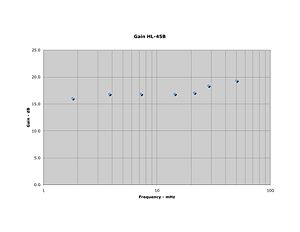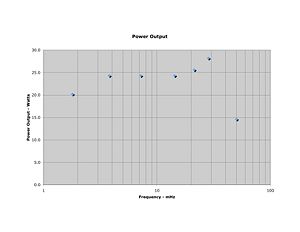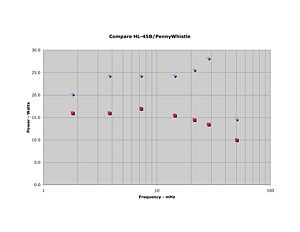Difference between revisions of "The Tokyo Hy-Power HL-45B Solution"
(→The Full Output Option: Posting the paper) |
m (→Overview:: added dash to "HL 45") |
||
| Line 21: | Line 21: | ||
====Overview:==== | ====Overview:==== | ||
This project set out to develop a 2-watt single ended IPA and keying interface between a Penelope and a Tokyo High Power Model HL-45B Linear Amplifier. | This project set out to develop a 2-watt single ended IPA and keying interface between a Penelope and a Tokyo High Power Model HL-45B Linear Amplifier. | ||
| − | Tokyo High Power HL-45B: With a rated output of 45 Watts and band-switchable harmonic filtering, the HL 45B is a good complement to Penelope. The HL-45 is specified for its 45 watts out with 5 watts in, but the experience of AD9DP and N6AS has been somewhat better than that – one can get by through 10m with about a watt, and certainly less than two watts. | + | Tokyo High Power HL-45B: With a rated output of 45 Watts and band-switchable harmonic filtering, the HL-45B is a good complement to Penelope. The HL-45 is specified for its 45 watts out with 5 watts in, but the experience of AD9DP and N6AS has been somewhat better than that – one can get by through 10m with about a watt, and certainly less than two watts. |
| + | |||
====T/R and Keying:==== | ====T/R and Keying:==== | ||
The HL-45B has a TTL level TX~/STBY input that can't connected to Penelope simultaneously with a T/R relay. It is further desirable to disable power to the IPA during receive so as not to amplify the output noise of Penelope's output buffers and present it at the T/R relay where might degrade the receiver. In this interface, Penelope controls the 12V coil of generic DPDT relay RLY1 via a connection to Pin 13 on its DB-25 port. One pole of RLY1 enables +12VDC to the IPA, the other pole provides T/R switching. The presence of +12V on the IPA throws switching transistor Q1 into saturation, keying the HL-45B through a 3mm rear panel jack and cable to its 8-pin Mini-DIN control connection. | The HL-45B has a TTL level TX~/STBY input that can't connected to Penelope simultaneously with a T/R relay. It is further desirable to disable power to the IPA during receive so as not to amplify the output noise of Penelope's output buffers and present it at the T/R relay where might degrade the receiver. In this interface, Penelope controls the 12V coil of generic DPDT relay RLY1 via a connection to Pin 13 on its DB-25 port. One pole of RLY1 enables +12VDC to the IPA, the other pole provides T/R switching. The presence of +12V on the IPA throws switching transistor Q1 into saturation, keying the HL-45B through a 3mm rear panel jack and cable to its 8-pin Mini-DIN control connection. | ||
====Schematic Diagram:==== | ====Schematic Diagram:==== | ||
Revision as of 12:04, 8 October 2009
The HL-45B is a small compact HF and 6 meter amplifier capable of 45 Watts output on all modes. Band switching is manual, but all required low pass filters are included. Because it requires 5 Watts input to drive it to full power, detailed construction notes are provided to provide a small preamp between the Penelope and HL-45B. Specifications and other information on the Tokyo Hy-Power labs' HL-45B are available at Tokyo Hy-Power's web site. Dick Faust, K9IVB, recommended that we use the FCC data on the HL-45B, if you use the links, you will probably need to rename the files to a name ending with ".pdf" and possibly download the Japanese fonts as requested by the Adobe Reader. The files were readable using Acrobat 9 using the view all files selection on my Mac. Here is the link: FCC files on the Tokyo Hy-Power HL-45B. Dick also mentioned "The schematic shows a 2db pad and the circuit description indicates 3db - might be able to short out and drive directly with Penny". Please let us know if this improves the solution if anyone tries it. Also we are looking for a way to interface PowerSDR with the band changing circuits in the HL-45B. If enough hams are interested, we could put this on our PowerSDR wish list.
The measured Gain of this amplifier is shown in Figure #1.
Contents
The Direct Connection Option
Phil Crosno, N6AS, did the initial work on the selection of this amplifier to provide additional power output for a HPSDR rig. His power output of a directly connected HL-45B to a Penelope/Mercury based transceiver is shown in Figure #2. Comparison of the HL-45B to the power output of the PenneyWhistle is shown in Figure #3 (using Penelope as the driver at 13.8 Volts in both cases).
The Full Output Option
Dave Poole AD9DP
October 7, 2009
Overview:
This project set out to develop a 2-watt single ended IPA and keying interface between a Penelope and a Tokyo High Power Model HL-45B Linear Amplifier. Tokyo High Power HL-45B: With a rated output of 45 Watts and band-switchable harmonic filtering, the HL-45B is a good complement to Penelope. The HL-45 is specified for its 45 watts out with 5 watts in, but the experience of AD9DP and N6AS has been somewhat better than that – one can get by through 10m with about a watt, and certainly less than two watts.
T/R and Keying:
The HL-45B has a TTL level TX~/STBY input that can't connected to Penelope simultaneously with a T/R relay. It is further desirable to disable power to the IPA during receive so as not to amplify the output noise of Penelope's output buffers and present it at the T/R relay where might degrade the receiver. In this interface, Penelope controls the 12V coil of generic DPDT relay RLY1 via a connection to Pin 13 on its DB-25 port. One pole of RLY1 enables +12VDC to the IPA, the other pole provides T/R switching. The presence of +12V on the IPA throws switching transistor Q1 into saturation, keying the HL-45B through a 3mm rear panel jack and cable to its 8-pin Mini-DIN control connection.


